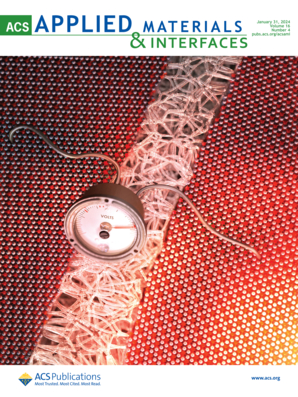Microfluidic Fabrication of Hyaluronic Acid-Cysteine-Modified Chitosan Microspheres for CD44-Targeted Probiotic Delivery in Colitis Treatment.
IF 8.3
2区 材料科学
Q1 MATERIALS SCIENCE, MULTIDISCIPLINARY
引用次数: 0
Abstract
Probiotics play a crucial role in regulating intestinal immune homeostasis and supporting gut health; however, oral administration faces challenges such as nonspecific distribution and low efficacy. To achieve precise and efficient delivery, in this study, a targeted delivery system embedded probiotics to the colonic inflammatory site CD44 was constructed by covalently linking hyaluronic acid (HA) to cysteine-modified chitosan (CCH) using microfluidic technology. Two probiotic strains, Bifidobacterium bifidum FL-276.1 and Clostridium butyricum ATCC 19398, were encapsulated within the modified chitosan matrix to form probiotics@CCH microspheres (MSs), with an average diameter of approximately 276 μm. Based on the receptor-ligand binding mechanism of HA and CD44, combined with the intestinal mucosal adhesion properties conferred by cysteine-modified chitosan, the probiotics@CCH MSs exhibited a high capture rate for inflammatory Caco-2 cells and demonstrated prolonged retention and targeted localization in a DSS-induced colitis mouse model. Furthermore, probiotics@CCH MSs contributed to maintaining intestinal homeostasis by modulating gut microbiota composition, enhancing short-chain fatty acid production, and supporting the intestinal barrier integrity. The microfluidic-based delivery system facilitates the precise localization of probiotics within the intestine, providing a theoretical basis for enhancing probiotic applications in gut health management.微流控制备透明质酸-半胱氨酸修饰壳聚糖微球用于cd44靶向益生菌治疗结肠炎。
益生菌在调节肠道免疫稳态和支持肠道健康方面发挥重要作用;然而,口服给药面临着非特异性分布和低疗效等挑战。为了实现精准高效的给药,本研究利用微流控技术将透明质酸(HA)与半胱氨酸修饰壳聚糖(CCH)共价连接,构建了益生菌嵌入结肠炎症部位CD44的靶向给药系统。将两歧双歧杆菌FL-276.1和丁酸梭菌ATCC 19398两种益生菌包封在改性壳聚糖基质内形成平均直径约276 μm的probiotics@CCH微球(MSs)。基于HA和CD44的受体-配体结合机制,结合半胱氨酸修饰壳聚糖赋予的肠粘膜粘附特性,probiotics@CCH MSs在dss诱导的结肠炎小鼠模型中表现出对炎性Caco-2细胞的高捕获率,并表现出长时间的保留和靶向定位。此外,probiotics@CCH MSs通过调节肠道菌群组成、促进短链脂肪酸产生和支持肠道屏障完整性来维持肠道稳态。基于微流体的输送系统有助于益生菌在肠道内的精确定位,为加强益生菌在肠道健康管理中的应用提供理论依据。
本文章由计算机程序翻译,如有差异,请以英文原文为准。
求助全文
约1分钟内获得全文
求助全文
来源期刊

ACS Applied Materials & Interfaces
工程技术-材料科学:综合
CiteScore
16.00
自引率
6.30%
发文量
4978
审稿时长
1.8 months
期刊介绍:
ACS Applied Materials & Interfaces is a leading interdisciplinary journal that brings together chemists, engineers, physicists, and biologists to explore the development and utilization of newly-discovered materials and interfacial processes for specific applications. Our journal has experienced remarkable growth since its establishment in 2009, both in terms of the number of articles published and the impact of the research showcased. We are proud to foster a truly global community, with the majority of published articles originating from outside the United States, reflecting the rapid growth of applied research worldwide.
 求助内容:
求助内容: 应助结果提醒方式:
应助结果提醒方式:


